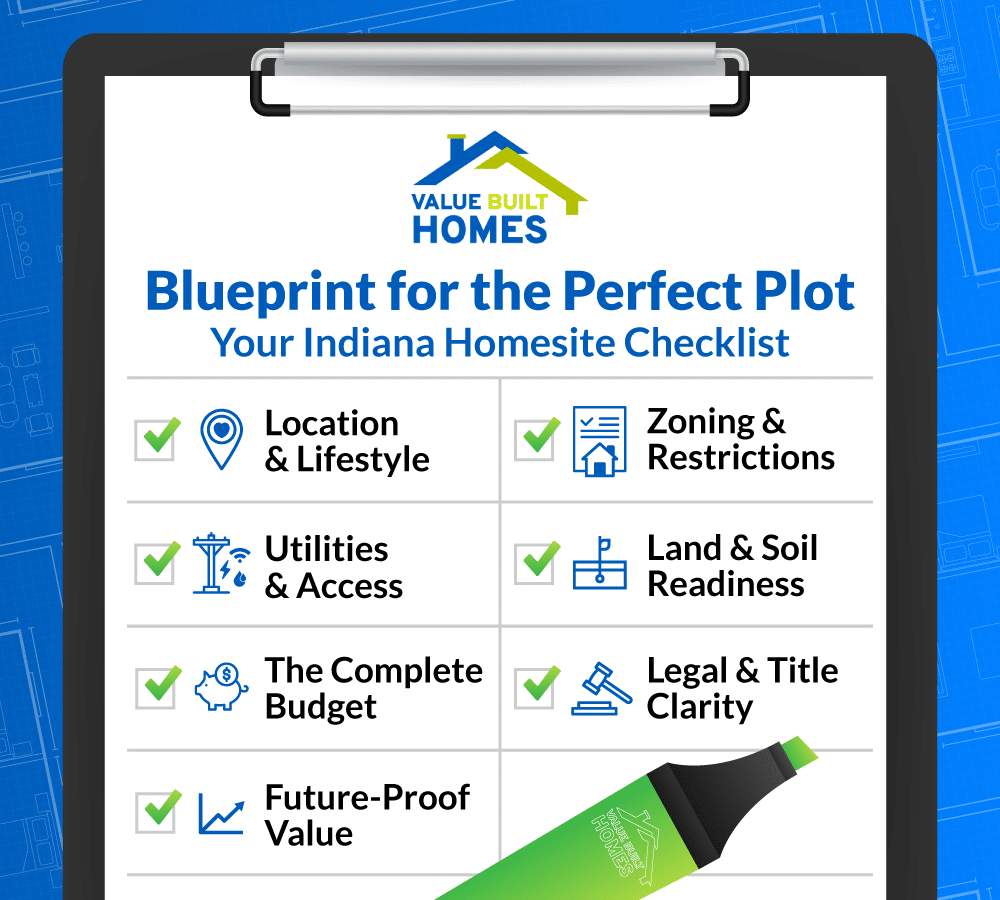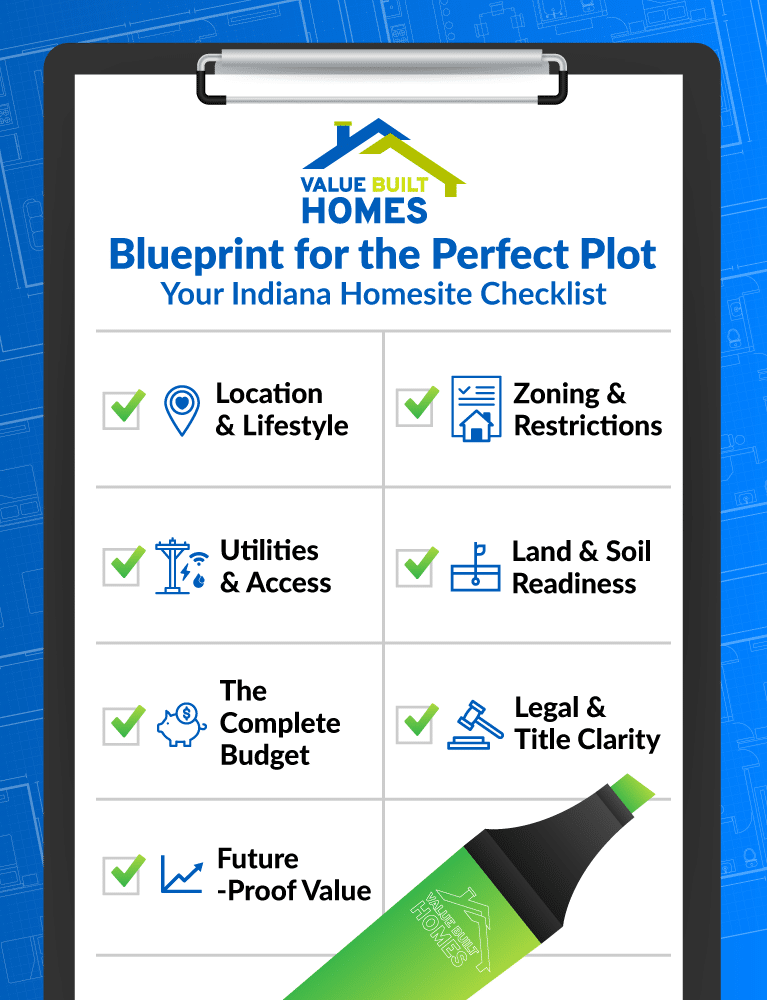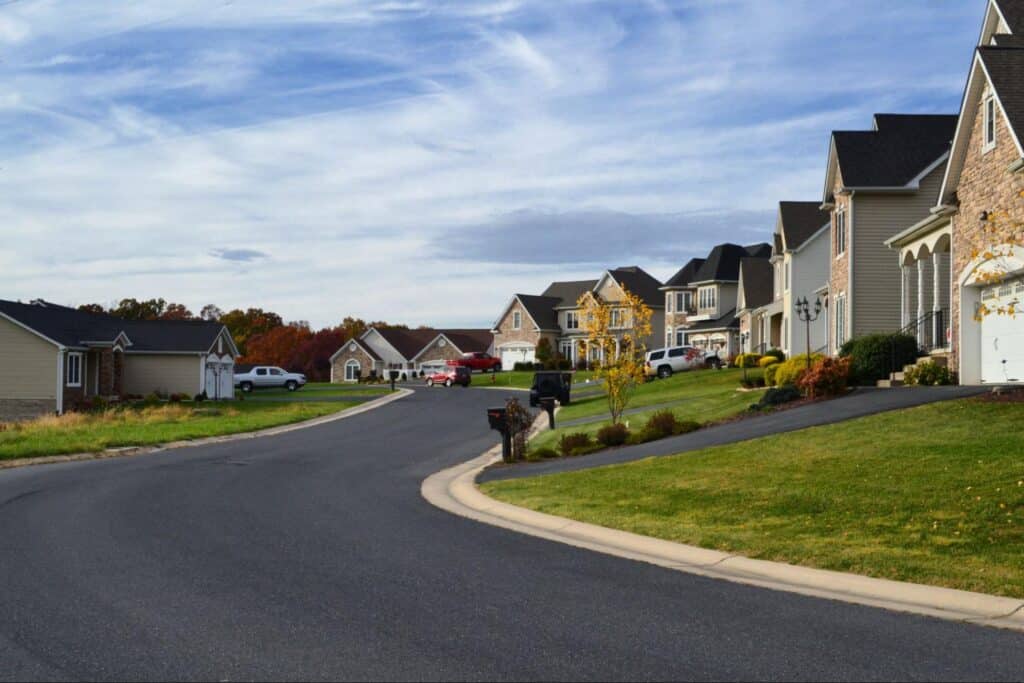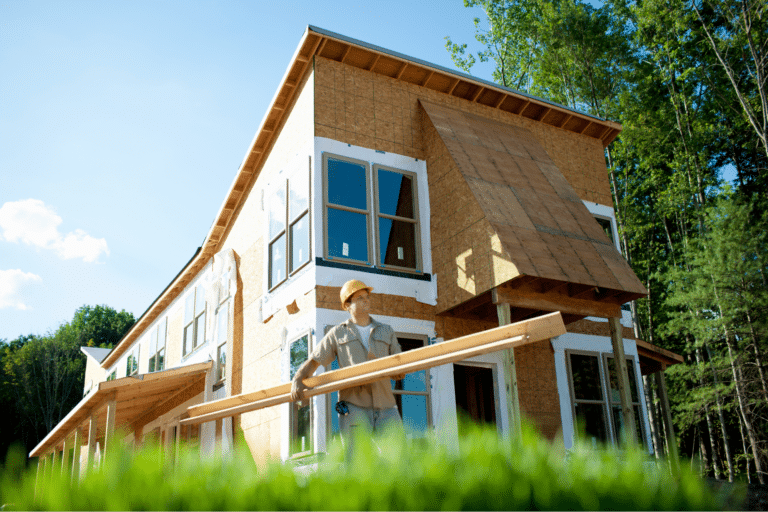Selecting the perfect homesite is a pivotal step toward creating the home of your dreams in Indiana. With a growing market driven by affordable pricing, many homebuyers are drawn to the state’s balanced mix of urban convenience and rural charm. Whether you aim to build your own home or work with trusted Indiana home builders, navigating factors such as finding the right location, understanding local regulations, ensuring utility availability, and checking soil quality can seem overwhelming.
This guide is designed to break down each step into clear, manageable advice. With support from experts at Value Built Homes, you can navigate this process confidently and make informed decisions on various homesite considerations, setting the stage for a rewarding, stress-free new home construction experience.


Location: The Foundation of a Great Homesite
Choosing a homesite is about more than just enjoying a scenic view—it’s choosing a lifestyle and ensuring long-term value. Indiana offers diverse communities, from bustling suburban areas to peaceful countryside retreats. Understanding local market trends, such as steady growth in property values, is key.
Key Factors for Evaluating Your Location
Consider these essential points when evaluating your potential homesite:
- Proximity to work, schools, and childcare can significantly reduce commute times and simplify daily routines.
- Easy access to amenities such as grocery stores, pharmacies, parks, and recreational spots ensures convenience.
- A safe neighborhood with family-friendly features like well-lit streets, community events, and active neighborhood associations—often overseen by local homeowners’ associations.
- Awareness of future local developments—new infrastructure projects or business openings can enhance property value but also increase traffic or change community dynamics.
Transitioning from location to local zoning matters, it’s important to know the legal landscape that will affect how you build on your chosen land.
Understanding Zoning Laws and Land Restrictions
Local zoning laws determine what you can build on a property and help maintain a harmonious community. In Indiana, properties are typically classified as residential, agricultural, or commercial. Residential zones are most commonly used for home building, while agricultural areas may have certain limits. Rather than focusing on complicated legal jargon, consider these plain-language points:
Simplified Zoning Considerations
- Properties in residential zones generally allow for a wide variety of home designs. In contrast, agricultural zones might restrict building size or style.
- Basic restrictions may include guidelines set by local homeowners’ associations regarding the appearance or dimensions of your home.
- A simple consultation with a local planning office or real estate professional can clarify rules and ensure your plans align with local requirements.
- For example, if you plan to add an extension to your home, verifying that such modifications comply with local zoning laws can save time and potential legal hassles later.
With a clear understanding of zoning, the next step is to ensure that essential services are accessible on your chosen land.
Utilities and Infrastructure
Before finalizing a homesite, verify that the property supports basic infrastructure. Ensuring that utilities are available can prevent costly surprises down the road. Indiana’s market often boasts properties with established connections, but rural areas may require additional arrangements.
Essential Utility Considerations
- Confirm that electricity is accessible—check for nearby power lines or existing service connections.
- Determine if there is access to a municipal water supply or if installing alternative water sources is necessary.
- For sewage, homes in remote areas may require a septic system instead of traditional sewer connections. A simple perc test can validate if the soil drainage is sufficient.
- Also consider modern needs such as reliable internet and natural gas service.
- In some instances, local governments offer incentives or support programs to help new homeowners connect with these services.
Smooth utility access lays the groundwork for safe and efficient construction. Next, let’s explore how to ensure the land itself is ready for building.
Soil Testing and Land Assessments

Before breaking ground, it’s essential to test the soil to confirm that your future home’s foundation will be secure. A basic soil testing procedure can reveal issues like drainage problems or potential instability.
What to Expect
- Professionals assess soil strength and drainage qualities to support your home’s foundation.
- Detailed property surveys mark boundaries precisely, reducing the risk of future disputes.
- In areas susceptible to flooding, a quick evaluation can determine if additional construction precautions are necessary.
- By addressing these factors early, you avoid delays and extra expenses during construction.
Clear insights from these tests help you make informed decisions about potential modifications or reinforcements needed for your home.
Budgeting and Hidden Costs
Financial planning is central to a smooth home-building experience. While the purchase price of the land is a significant factor, additional costs can arise during site preparation, utility installations, and permit processing. Understanding and planning for these expenses will keep your project on track.
Breaking Down Your Costs
- Primary expenses include the land price, construction permits, and site preparation.
- Hidden costs can emerge from driveway construction, land clearing, utility hookups, and road extensions.
- A practical budgeting tip is to set aside 10–20% of your overall budget as a contingency fund for unexpected expenses.
- By consolidating your financial planning into one cohesive strategy, you can ensure that every dollar is allocated efficiently, minimizing potential delays due to unforeseen expenses.
These streamlined insights into budgeting ensure that you are well-prepared for all aspects of the project without getting bogged down in excessive detail.
Assessing Legal Documentation
Ensuring that your chosen property has clear and clean legal documentation is vital. This step, though potentially daunting, can be simplified by focusing on the essentials.
Essential Legal Checks in Plain Language
- Review property deeds and titles to confirm clear ownership, free from liens or disputes.
- Check for easements and rights-of-way that might limit how you use or expand your property.
- A brief consultation with a real estate attorney or experienced professional can clarify any uncertainties, ensuring that you are fully informed before proceeding.
- This step guarantees that you start your home-building journey with a solid legal foundation, minimizing potential complications later.
Transitioning from legal matters to lifestyle considerations, your decision is not solely about the physical land but also the community that surrounds it.
Lifestyle and Community Considerations

A home is not just a structure—it’s a gateway to a community and lifestyle that enriches your day-to-day life. When choosing your homesite, consider the broader social elements that will influence your long-term satisfaction.
Community Insights
- Spend time in the area to understand the local vibe, from the pace of life and noise levels to community events.
- Familiarize yourself with local amenities like community centers, libraries, healthcare facilities, and recreational parks.
- Consider the potential for future growth. Communities with planned infrastructure projects or new business investments often indicate stronger long-term value.
- Integrating your lifestyle needs with practical considerations ensures that your new home is a perfect match for both function and comfort.
These community insights, combined with a precise evaluation of the physical land and legal requirements, form a comprehensive basis for your home-building journey.
Value Built Homes: Your Partner in Simplified Home Building
At Value Built Homes, the focus is on making your home-building process as stress-free and efficient as possible. They specialize in site built homes with quick construction times, leveraging extensive local expertise and streamlined floor plans to remove much of the guesswork traditionally involved in constructing your home.
The Value Advantage
- Enjoy peace of mind with local expertise that navigates Indiana’s building regulations and construction trends.
- Choose from a variety of ready-to-build floor plans designed to reduce decision fatigue and increase efficiency.
- Benefit from a well-organized construction schedule that minimizes delays and provides clear, practical guidance at every step.
- Their balanced approach combines affordability with quality, ensuring that you receive both a sound investment and a comfortable living space.
Working with a trusted partner like Value Built Homes ensures that every aspect of your project is handled with clarity and professionalism, from the initial site selection to the final touches on your dream home.
Your Roadmap to a Perfect Homesite in Indiana
Choosing the right homesite in Indiana is about making informed, confident decisions across several key areas—location, zoning, utilities, soil quality, budgeting, and legal documentation. When you carefully blend these practical considerations with an evaluation of the local community and lifestyle, you set yourself up for long-term satisfaction and home ownership success.
Ready to unlock your dream home journey? Contact our Value Built Homes team today to explore pre-vetted land options and discover how their simplified floor plans and expert guidance can transform your vision into a reality. Take the first step toward a hassle-free, stress-free home building experience—your dream Indiana home awaits!




